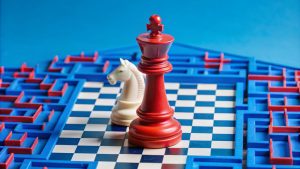Ultimate Guide to Chess and ADHD: Improving Attention and Self-Control
Chess and ADHD are two seemingly unrelated topics, yet they intersect in fascinating and beneficial ways. For individuals with Attention Deficit Hyperactivity Disorder (ADHD), managing symptoms like inattention, impulsivity, and hyperactivity can be a daily struggle. While traditional treatments such as medication and behavioral therapy are often effective, alternative methods like playing chess are gaining recognition for their unique ability to improve focus, self-control, and cognitive function in those with ADHD.
The strategic nature of chess makes it an ideal tool for enhancing attention and reducing impulsive behaviors. Unlike many other activities, chess demands sustained concentration, careful planning, and thoughtful decision-making—skills that are particularly challenging for individuals with ADHD. By regularly engaging in chess, individuals with ADHD can strengthen these abilities in a fun and stimulating way, leading to noticeable improvements in their daily lives, whether in academic settings, social interactions, or personal endeavors.
In this article, we’ll explore how chess can serve as an effective complement to traditional ADHD treatments. We’ll delve into the specific ways in which chess helps to sharpen attention and build self-control, examine the real-life benefits it offers, and provide practical tips for incorporating chess into an ADHD management plan. Whether you’re a parent, educator, or someone living with ADHD, understanding the link between chess and ADHD could be the key to unlocking greater focus, discipline, and success.
- Is chess a good game for ADHD?Yes, chess is great for ADHD. It enhances focus, promotes strategic thinking, improves self-control, and builds emotional regulation, making it a beneficial and enjoyable activity for managing ADHD symptoms.
- How can chess help individuals with ADHD?Chess can aid individuals with ADHD by enhancing focus, improving self-control, and fostering patience. The game’s strategic demands require sustained attention and careful planning, which helps individuals with ADHD practice concentration and manage impulsive behaviors. Additionally, chess provides a structured environment where players can develop skills like impulse control and delayed gratification.
- How do you focus on chess with ADHD?To focus on chess with ADHD, try breaking the game into smaller parts, setting specific goals, and taking regular short breaks. Playing in a quiet, distraction-free environment and practicing mindfulness can also help improve concentration.

Understanding ADHD: Challenges and Symptoms
ADHD is a highly complex condition and may manifest quite differently in each individual. Some may pay a price for attention, while others struggle more with sustained attention in tasks, following through with instructions, or failures in maintaining thoughts in order. Others still show themselves with hyperactive and impulsive behavior, characterized by fidgeting, excessive talking, or acting on impulse. Many people who have the symptoms of ADHD often experience a mix of these symptoms daily.
These problems often generalize to school and social spheres, where attention and impulse control become key elements of performance. In children, this may mean problems with school, peer relations, and an augmented risk of behavioral malfunction. In adults with ADHD, the problems may become visible as occupational under-functioning, a shift in relationships, or failure in managing daily responsibilities. The effective ways of promoting attention and self-regulation then become very important in enhancing the quality of life for the individuals who suffer from ADHD.
How Chess Helps Improve Attention in Individuals with ADHD
Chess is a strategy game that requires much concentration and great mental activity. It is, therefore, a very good tool for those people who have the problem of ADHD, which makes them lose their concentration.
Here’s how chess can help improve attention:
- Sustained Focus: Chess requires players to remain focused through large amounts of time while analyzing the board, planning moves, and trying to anticipate what the opponent will do. Through this continuous engagement, people with ADHD learn to inbuilt sustained attention, improving their abilities to focus on tasks for longer periods of time.
- Divided Attention: Chess requires focus from both players in each regard all at once. One has to notice pieces, calculate what the opponent might do, and plan strategy. This division of attention works in a very large way for people with ADHD because it exercises management and switching skills between tasks.
- Sequential Thinking: Chess requires planning many moves in advance, as each move executed will have its consequences. This kind of sequential thinking can benefit a person with ADHD by enhancing his or her planning and organizational skills through learning to predict and assess the outcomes.
- Minimizing Distractions: Being immersive, the game of chess allows the players to block out other surroundings and thus helps those with ADHD do the same. Focused attention—which can be transferred, in the long term, to areas of life such as schoolwork or job tasks—can be carried over.

Chess as a Tool for Enhancing Self-Control
Besides attention, chess is helpful in developing self-control, a major problem of ADHD people. The game itself enforces this characteristic, due to its nature—very patient and pondering—on two hallmark symptoms of ADHD: impulsivity and hyperactivity.
- Impulse Control: Chess teaches patience and careful consideration of actions in that impulsive moves create glaring disadvantages. The constituent part of this game encourages impulse control in people with ADHD by training them to stop, reflect, and act more deliberately.
- Delayed Gratification: Chess success is very often dependent on a long-term strategy rather than immediate gain. Such a need for delayed gratification helps people with ADHD learn to prioritize long-term goals over short-term impulses, a genuinely valued ability in both personal and academic contexts.
- Emotional Regulation: Chess also helps in controlling one’s feelings, teaching self-control when one is frustrated or under pressure. As a result, for those who have ADHD and often experience mood swings or emotional outbreaks, this will be a place where they can exercise their minds to be composed and focused.
- Building Patience: It is a slow game, which makes one patient over their turns and time to think over the moves they are going to make. This is especially very good for people with ADHD, since it enables one to learn patience, which lets one wait and delay an action without feeling restless and fidgety.
Real-Life Applications: How Chess Can Complement Traditional ADHD Treatment
While the game itself is not an independent treatment of ADHD, chess certainly can turn out to be one of the useful modalities among medication and behavioral therapy. Here are some benefits that chess can add to the comprehensive management of ADHD:
- Academic Improvement: Skills developed through playing chess—a portion of which include focus, planning, and self-control—might find direct transfer into improved academic performance. Children who have experience playing chess find it easier to do assignments, follow classroom instructions, and solve problems.
- Social Skills Development: Chess is often played as a social activity, be it in a club or through a school program, or on the Internet. Such socialization may improve the communication abilities of those with ADHD, sportsmanship, and relations with peers.
- Confidence Building: Success in chess can boost self-esteem and confidence if a person turns out to be good at it, which is particularly true for people who have certain attention deficit disorders and problems in other aspects of their lives. It gives the person confidence and helps to fight obstacles over various tasks.
- Stress Reduction: Playing chess may also act as a source of stress relief, whereby this focused, calm activity helps an ADHD mind to keep the surging anxiety level under control and thereby reduces stress.
How to Introduce Chess to Individuals with ADHD
For parents, educators, or therapists interested in introducing chess to individuals with ADHD, here are some practical tips:
- Start Simple: Start with the fundamentals of the game: the rules and how all the pieces move. Introduce complex strategies one by one as the person becomes comfortable with the game.
- Make it Fun: Make it fun—add games, challenges, or friendly competition, but don’t let it become a chore, as this can be rather disconnecting from the game.
- Use Technology: This can be particularly engaging for kids with ADHD. Many chess applications and beginner websites offer interactively guided lessons, puzzles, and the opportunity to develop wits against other players.
- Encourage Regular Play: Also, ensure they practice it regularly enough in chess for these abilities to be conditioned. This may be done through a chess club, in a school program, or just by playing at home.
- Integrate with Other Therapies: Work with a therapist to integrate chess into a broader ADHD treatment plan. This will help maximize the advantages of chess while being coherent with the therapeutic goals set for the individual.

Conclusion
Chess and ADHD is more than just a game; it’s a powerful ally in the journey to improve attention and self-control in individuals with ADHD. Through the strategic demands of chess, players with ADHD develop the ability to control their attention, manage impulses, and practice patience—essential skills for overcoming life’s challenges. Chess and ADHD not only sharpens cognitive abilities but also imparts valuable life skills, contributing to academic success and stronger social relationships.
In the ongoing search for effective ways to manage ADHD, chess naturally stands out as both practical and profound. Whether used as an adjunct to traditional treatments or as a mental stimulus, chess offers an enriching avenue for personal growth and empowerment. For people with ADHD, it’s not just about mastering the game; it’s about acquiring the skills needed to live a more focused, controlled, and rewarding life.
We’ve prepared a podcast to accompany this article, offering the same insights in an audio format. If you enjoy listening, give it a play:
References:
- American Psychiatric Association. (2013). Diagnostic and Statistical Manual of Mental Disorders (5th ed.). Arlington, VA: American Psychiatric Publishing.
- Burgoyne, A. P., et al. (2020). “Chess Instruction Improves Executive Functioning: A Randomized Controlled Trial.” Psychological Science, 31(7), 897-908. doi:10.1177/0956797620902425.
- Gobet, F., & Campitelli, G. (2006). “Chess Players are Not Experts in Cognitive Skill: Evidence from a Study of Executive Functioning.” Psychology of Sport and Exercise, 7(5), 647-663. doi:10.1016/j.psychsport.2006.01.003.
- Sullivan, J. R., & McGinnis, J. (2013). “The Effect of Chess on Academic Performance in At-Risk Students.” International Journal of Special Education, 28(2), 90-96.
- Yuffa, D. (2021). “Breaking Stereotypes: How Chess Changed My Life as an Autistic Player.” ChessBase Magazine, 195, 45-46.
- Aksu, O., & Altun, A. (2017). “The Effect of Chess Training on the Cognitive Skills of Children with Autism Spectrum Disorder.” Journal of Education and Training Studies, 5(3), 98-104. doi:10.11114/jets.v5i3.1933.
- Garrison, K., & Burch, M. (2020). “Building Social Skills Through Chess: A Pilot Study.” Journal of Autism and Developmental Disorders, 50(4), 1362-1374. doi:10.1007/s10803-019-04016-7.
- Sala, P., Gobet, F., Trinchero, R., & Ventura, M. (2017). “The Effect of Chess Instruction on the Cognitive Skills of Children: A Meta-Analysis.” Intelligence, 61, 1-12. doi:10.1016/j.intell.2016.11.005.



1 Comment
online pharmacy busted · 17/04/2025 at 22:29
Hello, I think your site might be having browser compatibility problems. Whenever I look at your website in Safari, it looks fine however when opening in IE, it’s got some overlapping issues. I simply wanted to provide you with a quick heads up! Besides that, wonderful blog!